2023 Annual Report: 20 Years of Transforming Media and Tech
A MESSAGE FROM OUR CO-CEOs
Free Press has turned 20 — and we have so much to celebrate!
When Free Press was born, very few organizations were talking about the need to give people a say in the media-policy decisions that shape their lives. Both lawmakers and regulators made decisions behind closed doors, catering to corporate wish lists and ignoring public input. In debates about Net Neutrality, the digital divide, media consolidation, local journalism and so much more, Free Press and its companion organization, Free Press Action, have worked to elevate community perspectives and amplify the voices of people of color. We can see the results in so many of the wins we’ve achieved — and 2023 was no exception.
And you — our donors and activists — make all of Free Press’ success and future plans possible. We couldn’t be more grateful.
Your generous support keeps us independent from the government, political parties and the industries we track — and allows us to work solely for the public interest. Read on to learn what you helped us accomplish in 2023.
Onward,
Craig Aaron and Jessica J. González
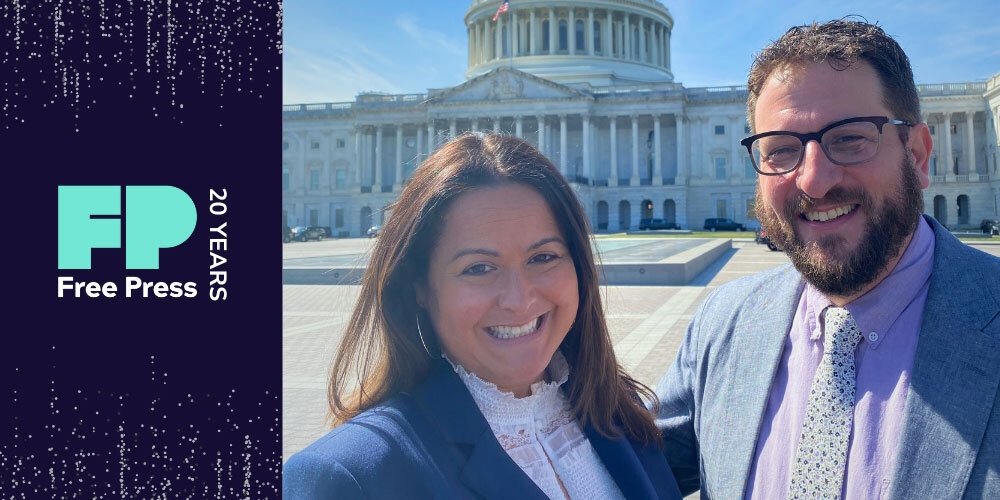
CLOSING THE DIGITAL DIVIDE
Over the past 20 years, we’ve shown how the digital divide robs millions of people of crucial opportunities. Through both groundbreaking research and ongoing advocacy, we’ve pushed decision-makers to recognize the need to make high-speed internet both affordable and available to everyone. In 2021, Free Press Action’s work paved the way for the historic $65-billion investment in broadband in the infrastructure package that President Biden signed into law.
A remarkable $14.2 billion of that total was dedicated to the creation of the Federal Communications Commission’s Affordable Connectivity Program, which we helped shape. The ACP, which launched in 2022, provides households living near the poverty line or enrolled in other federal-aid programs with up to $30 per month for the internet package of their choosing — and $75 per month for people living on Tribal lands. Nearly 23 million households — which translates to one in six U.S. households — have already signed up to take part in the ACP, and the numbers keep rising. In fact, the program has proven so popular that it’s in danger of running out of funds by April 2024. We’re urging Congress to pass the Affordable Connectivity Program Extension Act, which would keep families connected through the end of the year. We’re also calling on lawmakers to invest in the program long term and make the ACP permanent.
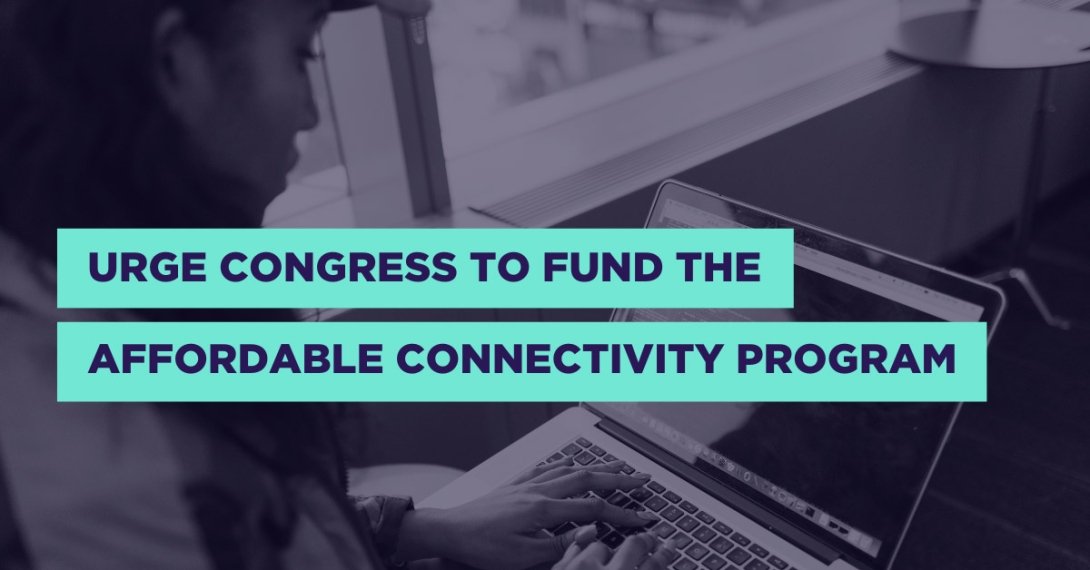
In June 2023, Co-CEO Craig Aaron attended a White House ceremony where President Biden and Vice President Harris announced $42 billion in funding for the Broadband Equity, Access, and Deployment program, which also grew out of the infrastructure bill. This money will help all 50 states build high-speed internet networks in communities that lack access.
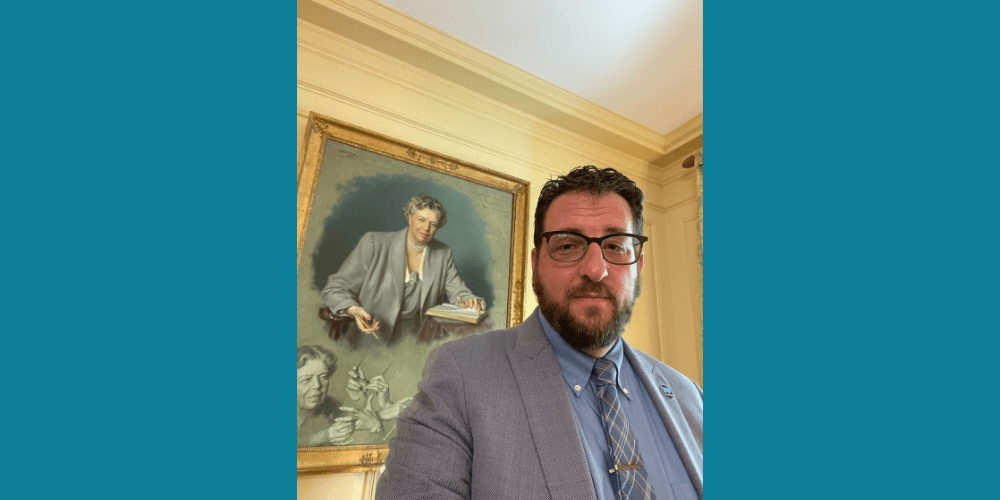
Free Press Co-CEO Craig Aaron at the White House, where President Biden and Vice President Harris echoed Free Press’ old talking points about why we need the internet for everyone.
Over the course of the last 20 years, Free Press has helped change the debate over broadband. “Hearing the most powerful people in the world repeatedly proclaim that the internet is a necessity — ‘not a luxury’ — is no small thing, and it’s a testament to our many colleagues and allies who have been pushing for decades to make internet service available, affordable and universal,” Aaron said.
In February 2023, we called on the FCC to adopt strong rules that prohibit broadband providers from discriminating against customers as they build out their networks. We pointed to evidence that low-income families and people of color are far more likely to live in areas where there’s just a single high-speed internet provider — and are unable to access the benefits that people living in more affluent areas enjoy. In November, the FCC adopted new rules banning digital discrimination — while also creating a complaint process that will enable its enforcement bureau to seek remedies when discrimination occurs.
We’re working with our colleagues in the Utility Justice Coalition — which includes more than 170 social-justice, environmental, faith, health and labor groups — to push Congress to ban companies from disconnecting customers’ utilities, including broadband connections. “It’s really simple: Disconnecting people from lifesaving utilities is wrong,” said Internet Campaign Director Heather Franklin, who serves on the coalition’s steering committee. “Our elected officials must act with the urgency this moment requires to keep everyone in our communities safe and healthy.”
In 2022, Reps. Cori Bush, Jamaal Bowman and Rashida Tlaib introduced the Utility Justice Human Rights Resolution, which declares that access to broadband, water, power, heating and cooling are human rights. The resolution is the product of work with the Utility Justice Coalition. In the wake of record-breaking heatwaves during the summer of 2023, the lawmakers once again pressed congressional leaders to take action.
MAKING PROGRESSIVE POLICY POSSIBLE AT THE FCC
As soon as President Biden took office, Free Press Action began mobilizing public-interest groups and activists across the nation about the need to fully staff the FCC following four years of destructive decisions during the Trump administration. In 2023, we led a multi-pronged campaign in support of nominee Anna Gomez, a State Department senior technology adviser, former FCC and National Telecommunications and Information Administration official, and corporate attorney. The Senate confirmed Gomez to serve as the tie-breaking vote at the FCC in September — ending the 960-day deadlock at the agency.
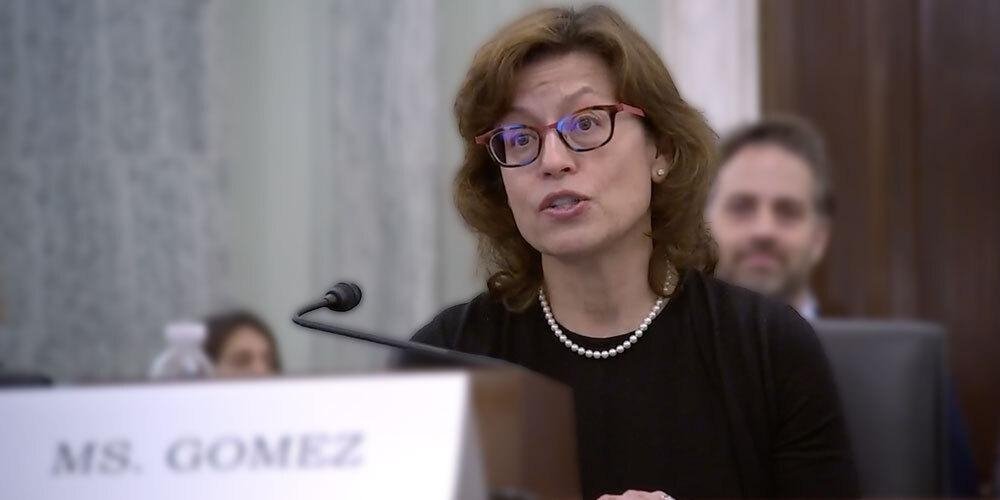
The Senate’s confirmation of Anna Gomez has broken the unprecedented deadlock at the FCC.
“I’m confident that Commissioner Gomez will be a champion for consumers. She has deep expertise on the issues and a strong track record of public service. I’m especially excited to welcome the first Latina FCC commissioner in more than two decades,” said Co-CEO Jessica J. González.
Now that we finally have a fully functional FCC, the agency has the votes it needs to reinstate Net Neutrality, expand affordable internet access, investigate its history of racism and move forward on other urgent priorities. We’re pushing it to take swift action on all of these issues.
RESTORING NET NEUTRALITY
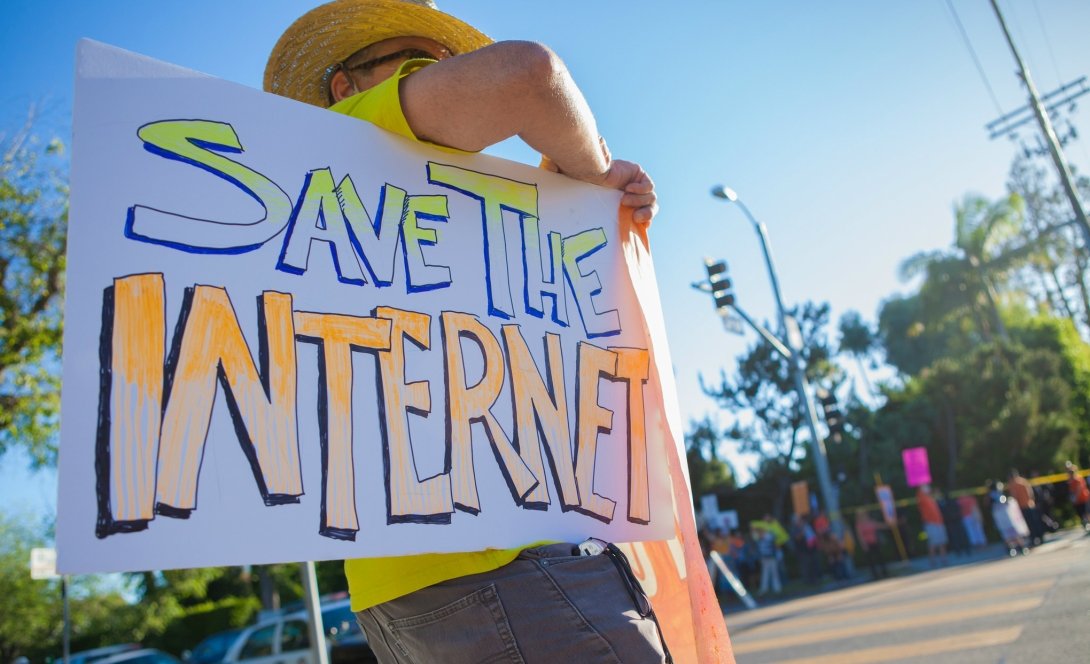
Stacie Isabella Turk/Ribbonhead
In Free Press’ earliest years, we put the fight for Net Neutrality on the map. And from the beginning we’ve pushed the FCC to adopt open-internet rules based in Title II of the Communications Act. We won that fight in 2015 — and mobilized millions of people to respond when the Trump FCC threatened to repeal those protections. When the agency ignored the overwhelming outcry and overturned the Net Neutrality rules in 2017, we vowed to keep fighting.
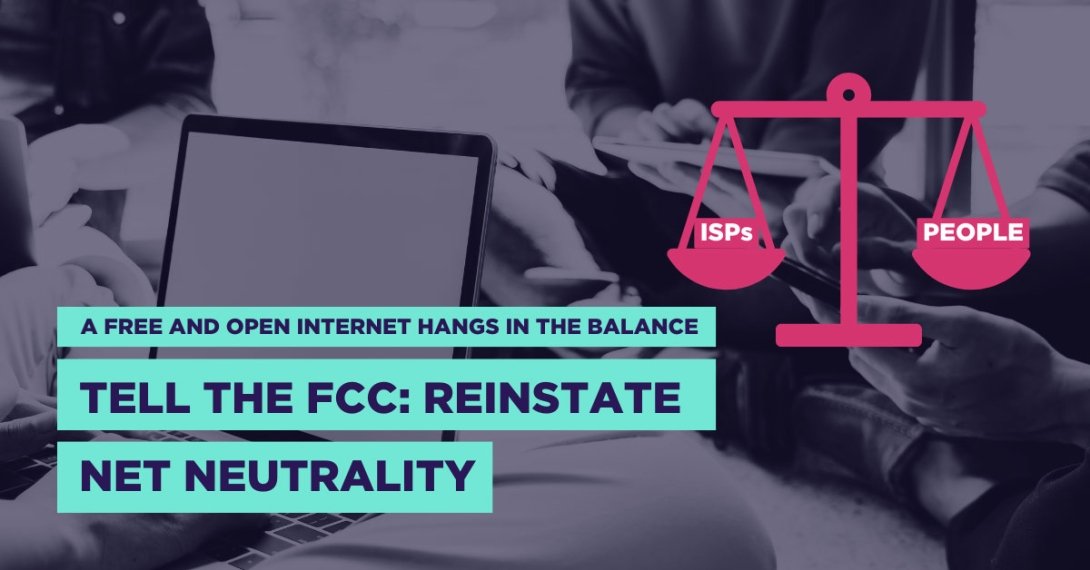
Thanks in part to our leadership, this spring the Biden FCC is expected to bring back the Net Neutrality rules — and restore its Title II authority to hold companies like AT&T, Comcast and Verizon accountable. This is a major win. Following Anna Gomez’s confirmation to the FCC, we launched a campaign to urge the agency to take speedy action on Net Neutrality and Title II. We mobilized thousands of people around the country to echo this call, and the FCC opened a proceeding on the topic in October. FCC Chairwoman Jessica Rosenworcel has been a strong partner in this fight. “The [Trump-FCC repeal] put the agency on the wrong side of history, the wrong side of the law and the wrong side of the American public,” she said.
Our research team has submitted multiple rounds of detailed policy comments that documented the many benefits of Title II oversight: “Title II is not just a legal framework that protects Net Neutrality,” we wrote. “The ability to access quality broadband service no matter where one may live, or no matter one’s racial or ethnic identity, still matters. The ability to subscribe to broadband at an affordable price still matters. The need for the network to work — keeping people connected on the daily, but also before, during, and after times of emergency — still matters. And the assurance that network operators respect their customers’ privacy still matters, arguably more so in the data era.”
Co-CEO Craig Aaron debated FCC Commissioner Brendan Carr — a longtime opponent of Net Neutrality and Title II — on NPR. “The importance of Title II is the FCC’s authority to step in and adapt and respond,” Aaron said. “We have this long record of [broadband providers] scheming and cutting corners. We want the agency to be able to step in and say no, you can’t gouge customers like that. Yes, we need more information about outages when they happen. … The FCC shouldn’t have to go to these companies and beg and say please, please, please, don’t cut customers off.”
The highlight of the debate: all the people calling in from across the country to say why they favor Net Neutrality.
COMBATING HATE AND DISINFORMATION IN TECH
Since Elon Musk took over Twitter in October 2022, the social-media platform has become a toxic cesspool of hate and disinformation. We organized the #StopToxicTwitter campaign to show Musk and other tech CEOs that we will hold them accountable for amplifying bigotry and lies. Musk has instituted mass layoffs, gutted content-moderation rules and reinstated thousands of previously banned accounts known for spreading hate and lies. In response, the Stop Toxic Twitter campaign successfully pushed more than half of the platform’s top-1,000 advertisers to stop spending on the platform — a crucial win given that advertising once accounted for 90 percent of Twitter’s revenues. The longer-term impacts of our campaign are still being felt at the company: The New York Times reported in June that U.S. advertising revenue at Twitter — now rebranded as “X” — was down 59 percent from the year before. (Musk blamed the “nonprofits who influence the advertisers.”) And in January 2024, Fidelity — which bought a stake in Twitter the month Musk purchased it — marked down the October 2022 share valuation by 71.5 percent. This campaign showed other social-media companies that cozying up to racists, authoritarians and conspiracists is bad for business.
Alongside our allies, we’re also serving as a crucial watchdog, showing how ads from Twitter’s remaining advertisers are running adjacent to hateful and deceitful tweets. To highlight these harms we’re using creative campaign tactics — like flying #StopToxicTwitter banners over a Miami advertising convention where Musk gave the keynote address in April.
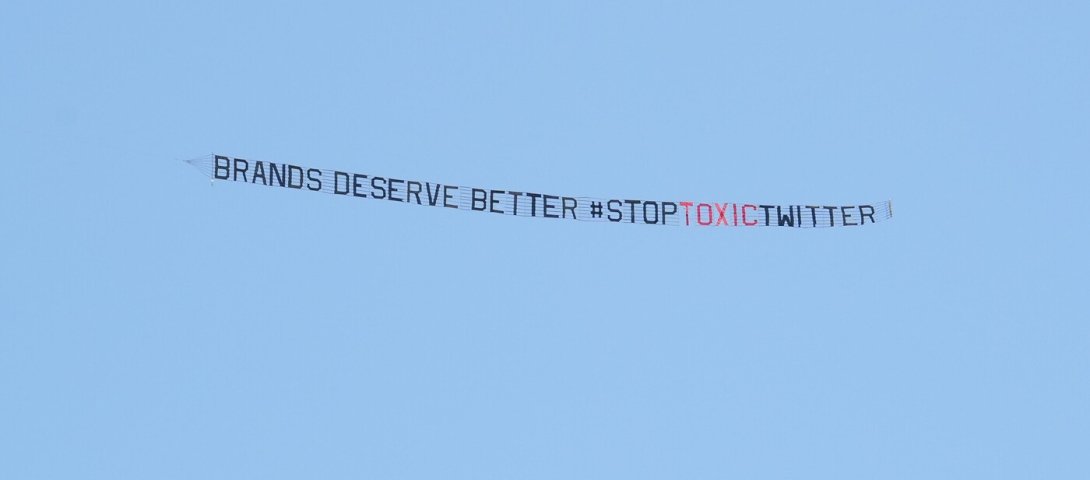
We scored a major legal victory in 2023. In May, the Supreme Court rejected arguments that could have invalidated Section 230, a law that shields platforms from liability for content their users create and post. Free Press Action and several allies filed an amicus brief in this case to ensure that platforms can continue to remove hate and disinformation from their sites.
“Section 230 encourages the open exchange of ideas and takedowns of hateful and harmful material,” said Vice President of Policy and General Counsel Matt Wood. “Losing the core of Section 230 would have risked chilling online expression, which would disproportionately harm Black and Brown communities, LGBTQIA+ people, immigrants, religious minorities, dissidents, and all people and ideas targeted for suppression or harassment by powerful forces.”
Throughout the year, we raised alarms as social-media platforms abandoned safety measures they had instituted in the wake of the Jan. 6 insurrection. And in December, we released the report Big Tech Backslide: How Social-Media Rollbacks Endanger Democracy. The report analyzes a year of platform-policy rollbacks, layoffs and reinstatements of dangerous and extremist accounts to show how the major social-media platforms are failing to safeguard elections and protect public safety.

The Associated Press, The Guardian, NBC, The New York Times, NPR and Reuters all covered Big Tech Backslide, which shows how the failures of Meta, Twitter and YouTube have created a toxic online environment that is vulnerable to exploitation from anti-democracy forces, white supremacists and other bad actors. While TikTok has beefed up its content moderation, collectively the other three platforms have removed 17 policies that had guarded against hate and disinformation — and laid off more than 40,000 employees and contractors, with many of those job losses occurring on trust and safety teams.
“Big Tech executives like Elon Musk and Mark Zuckerberg have made reckless decisions to maximize their profits and minimize their accountability,” said report author Nora Benavidez, senior counsel and director of digital justice and civil rights.
SAFEGUARDING PRIVACY AND CIVIL RIGHTS
Using a rideshare app. Browsing an online store. All kinds of everyday activities generate personal data about our identities, preferences, behaviors and more — and all kinds of companies use this information to target people for profit. In September, we released Insatiable: The Tech Industry’s Quest for All Our Data, a research report that investigates these practices and analyzes the privacy policies of the three social-media platforms — Bluesky, Mastodon and Threads — vying to replace Twitter. The report, which The Washington Post covered in an exclusive, shows the need for regulatory oversight to safeguard our digital privacy and mitigate corporate hunger for all our data. “Tech companies have been free to self-regulate their data-collection practices for more than two decades now — and they’ve failed to protect user privacy and civil rights,” said report author and Free Press Policy Counsel Jenna Ruddock. “The urgent need for comprehensive federal privacy rules couldn’t be clearer.”
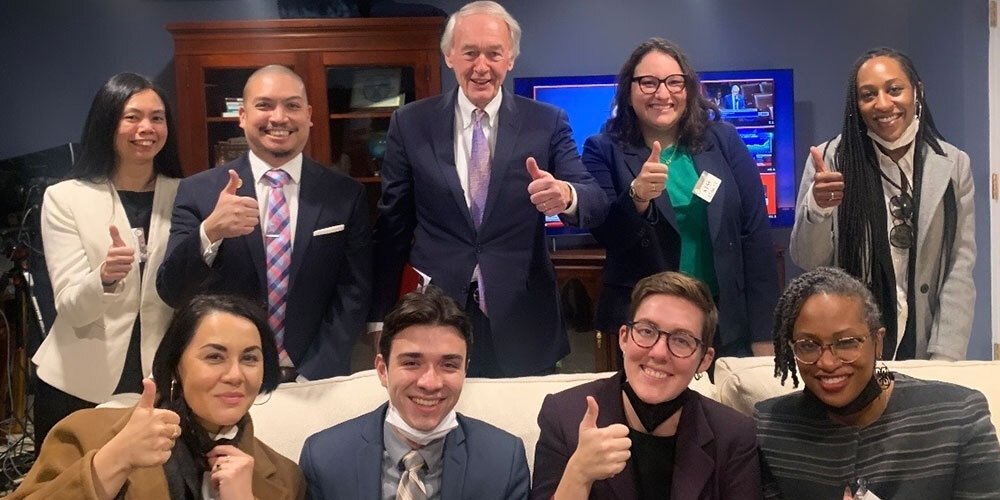
Free Press Action staffers and partners in the Disinfo Defense League with Sen. Ed Markey
To mark the report’s launch, we held a webinar featuring remarks from Sen. Ed Markey, who reflected on working for many years alongside Free Press:
“For two decades, Free Press has served as a champion of the free and open internet, a defender of democratic values and of course a relentless advocate for online privacy rights. When freedom is in jeopardy, Free Press is there to ensure that we stay on the right side of history. A commitment to a diverse media ecosystem and having the courage to challenge the big-tech oligarchs has never been more important.”
At the urging of Free Press and our allies, in 2022 the Federal Trade Commission opened a rulemaking on measures to stop corporations from exploiting people’s personal data. Since then, we’ve worked with our Disinfo Defense League partners to make sure the agency listens to people of color, women and other disproportionately impacted communities. In December 2023, we met with staffers from the FTC and the Consumer Financial Protection Bureau to discuss the harms of corporate surveillance and the need for reforms. We also organized meetings with six congressional offices in Washington and invited allies to discuss issues related to social-media platforms, including rampant disinformation, language disparities in content moderation, government surveillance reform, the civil-rights implications of AI and the need for data-privacy legislation.
Free Press has also been organizing a process with our DDL allies to collect stories from people about their experiences with online disinformation, misinformation, fraud and scams. So far we’ve collected more than 120 stories, including ones from people who have seen loved ones fall prey to lies about COVID, vaccines and the 2020 election.
We’re also building momentum for a comprehensive federal privacy bill. There is a real hunger for this kind of legislation: Nearly 300 data-privacy bills have been introduced at the state level. “Clearly, those in power at all levels of government recognize that more needs to be done to protect our sensitive data,” said Government Relations Manager Amanda Beckham. “Still, a national landscape where data-privacy legislation varies from state to state leaves people unprotected in states without good laws.”
Free Press Action has been working with public-interest allies and lawmakers to pass the Fourth Amendment Is Not for Sale Act. Right now, law-enforcement agencies like the FBI can buy people’s online data — including location and search histories — without a warrant. Since the fall of Roe v. Wade — and the criminalization of abortion in more than 20 states — this practice is more alarming than ever. In July, the House Judiciary Committee passed the bill — the farthest the legislation has ever advanced.
And as the debate about AI safety heated up, Free Press convened a global coalition of digital-justice and human-rights leaders in May to call attention to how artificial intelligence disproportionately harms women, people of color, the LGBTQIA+ community, ethnic minorities and economically disadvantaged people from around the world. Our open letter urges the media and policymakers to include experts from affected communities in debates about AI: “We’ve experienced firsthand the impacts when AI systems are used to discriminate against us, when tech companies try to silence us, when hate and harassment campaigns target us, and when governments exploit technology to surveil and oppress us.”
We scored a legal victory in June, when a federal appeals court ruled that Facebook can be sued for allegedly discriminating on the basis of race and sex in housing advertisements. The platform had created an advertising tool that allowed companies to exclude certain groups, like women of color and single parents, from seeing their ads.
The court’s ruling is a major victory for digital civil rights. In line with arguments Free Press and allies made in our amicus brief, the court ruled that platforms are as accountable for online violations of civil-rights laws as they are when violations occur offline.
Free Press Action teamed up with allies in the Disinfo Defense League to host a Capitol Hill briefing in March. The event focused on the harms that privacy violations, digital redlining, hate speech and disinformation pose for people of color and others who experience online discrimination. Co-CEO Jessica J. González moderated the briefing, which featured remarks from Sen. Ben Ray Luján and advocates from allied groups. The stakes are high: As González noted, malicious online forces are working to “undermine democracy, peaceful transitions of power and the right to vote.”
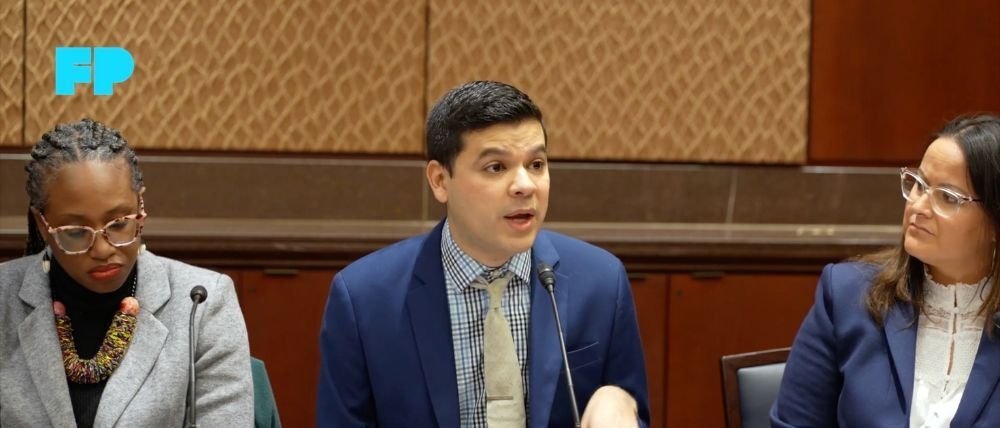
Free Press Co-CEO Jessica J. Gonzàlez (right) with Disinfo Defense League allies
ORGANIZING FOR MEDIA REPARATIONS
In 2020, Free Press’ Black staff launched the groundbreaking Media 2070 project, which seeks to create a future in which Black people control the creation, production and distribution of their own stories. Since then, Media 2070 has led the call for media reparations as compensation for the many harms newsrooms and policymakers have inflicted on Black people. 2023 was another momentous year for this endeavor: In the days leading up to Juneteenth, Media 2070 and the Black Thought Project debuted the Black Future Newsstand — a custom-built art installation — at a series of public events in Harlem. The installation invited people to consider the question “What does a media that loves Black people look, feel and sound like in a future where reparations are real?” The newsstand’s shelves were filled with publications that centered Blackness, and visitors of all ages covered the exhibit’s Black Thought Wall with their visions of the media’s future.
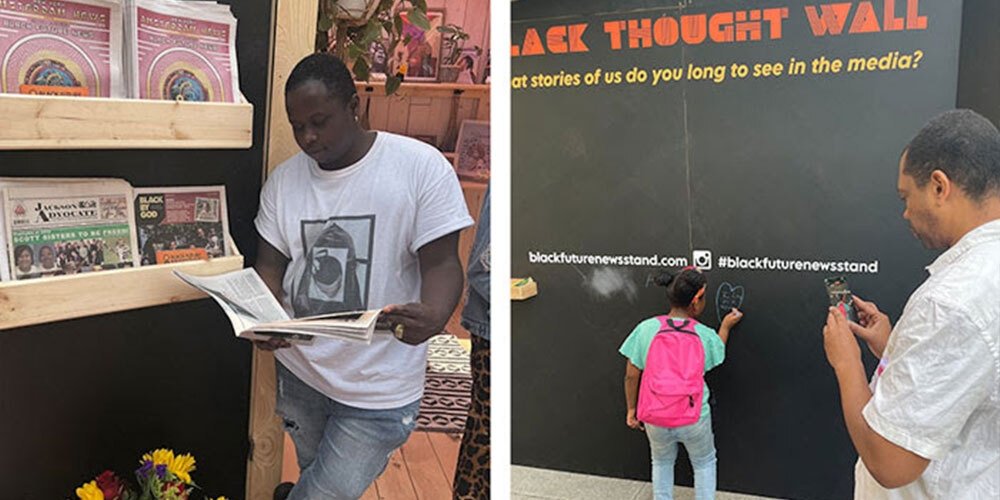
Our Media 2070 team is working to create a future that celebrates and cares for Black people. Last year, we got a glimpse of that future at its Black Future Newsstand exhibit.
A documentary featuring behind-the-scenes interviews and footage from the project’s creation is in the works. Media 2070 also collaborated with New York’s Amsterdam News — the oldest Black-owned newspaper in the United States — on a special insert for the Juneteenth print edition. To coincide with the newsstand’s debut, Media 2070 Project Director Collette Watson, who’s also Free Press’ VP of cultural strategy, co-wrote a powerful TIME magazine Op-Ed that made the case for reparations.
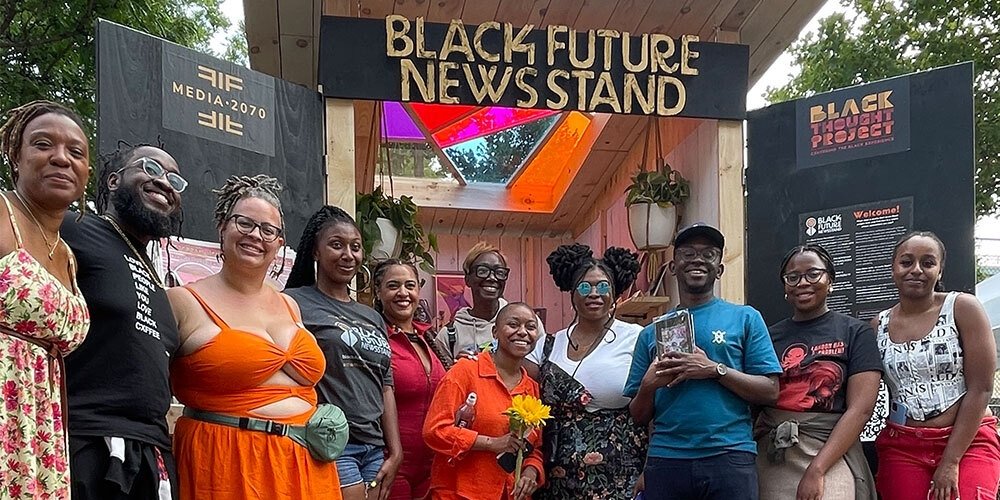
Black Future Newsstand came to life in Harlem as a custom-built art installation
Media 2070 is helping shape the national debate about the need for media reparations. The Columbia Journalism Review profiled Watson in July; in the piece, she discussed Media 2070’s emphasis on creating a culture built on care for Black journalists and communities.
In November, Reparative Journalism Program Manager Diamond Hardiman and Media 2070 Campaign Manager Venneikia Williams brought a travel-sized version of Black Future Newsstand to the Afrotech conference in Austin. This version of the installation engaged participants in questions about their own experiences and dreams for the future of Black storytelling and technology.
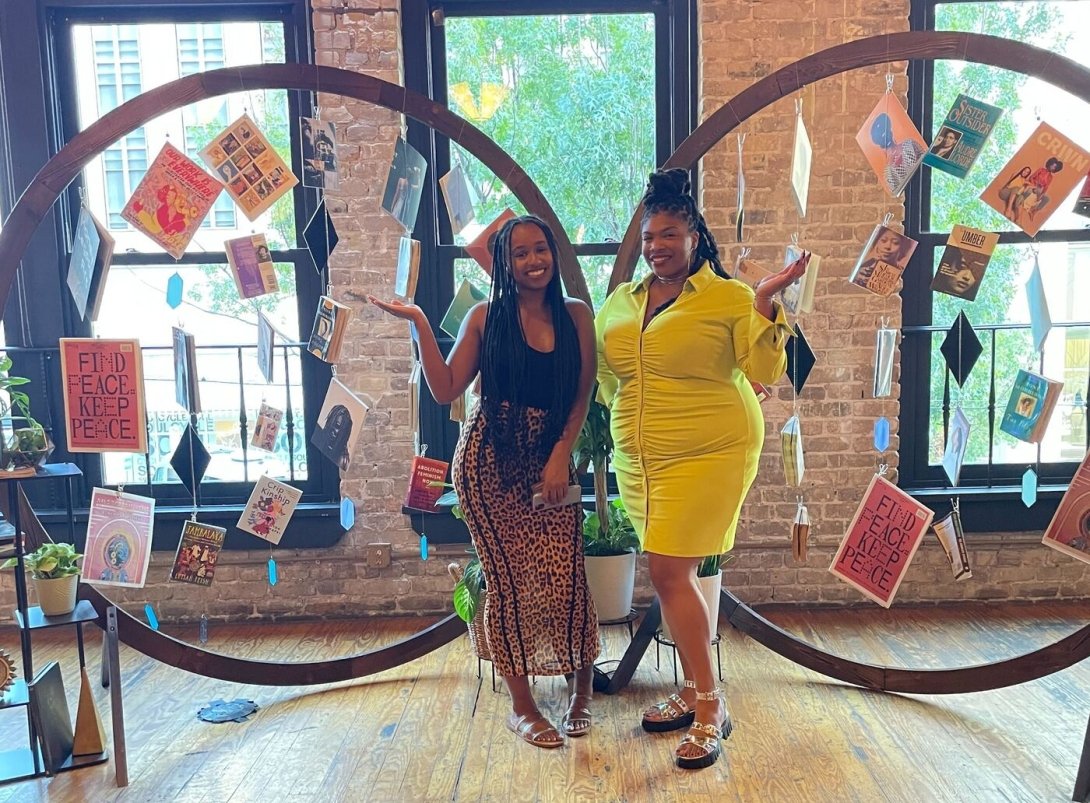
In 2023, the Media 2070 team continued to tour its award-winning documentary Black in the Newsroom, which explores what happens when a talented journalist experiences systemic racism at The Arizona Republic and contends with pay so low she has to choose between buying groceries and paying rent. Directed by Watson, the film screened to great acclaim at Indie Film Fest, Montclair State University and San Diego State University, among other venues.
In May, the team debuted its first-ever college course: “Diagnosing the Media System,” which Venneikia Williams taught at Colorado College. Using the visionary Media 2070 research essay as a starting point, the class examined how the media system has harmed communities of color for centuries. Colorado College has invited Media 2070 to return to teach the class in 2024, and the team is hoping to take this course to other college campuses, especially Historically Black Colleges and Universities.
The Media 2070 team had a big policy win when the California Reparations Task Force recommended that the state create a Black media reparative fund. This recommendation drew on Media 2070’s research and advocacy. This task force’s historic report is the first state-level study of reparations.
CRAFTING JOURNALISM POLICY
Over the past 20 years, Free Press has worked hard to ensure that people have the news they need for their families, their communities and democracy to thrive. In February, Free Press’ Mike Rispoli and colleagues from Chalkbeat and City Bureau published The Roadmap for Local News: An Emergent Approach to Meeting Civic Information Needs. The result of a year-long research effort, the roadmap sets forth a visionary and actionable plan to ensure that every U.S. community has access to necessary civic news and information.
The Roadmap influenced the development of Press Forward, a major philanthropic initiative that will invest $500 million in local journalism. With two local newspapers shutting down every single week, this project couldn’t be more necessary. As one of the 17 initial MacArthur Foundation Press Forward grantees, Free Press will receive a grant to support the creation of local and state policies that prioritize the information needs of underserved communities.
In November, Free Press began a collaboration with the nonprofit newsroom The Objective on a series highlighting the civic-media field. The series has included pieces on how public-access television can share vital information and the need for a media ecosystem that promotes justice.
The news crisis is also prompting lawmakers to examine how to use public policy to keep communities informed. Not all solutions are good ones, however — and Free Press Action had a big win when it helped push California lawmakers to temporarily shelve the short-sighted California Journalism Preservation Act. The CJPA would reward the media conglomerates and hedge funds that have destroyed local news and make it harder for small community-centered newsrooms to survive. The bill was on a fast track, but the campaign from Free Press Action, other advocacy groups, small publishers and community leaders pushed the bill’s sponsors to delay consideration of the CJPA until 2024.
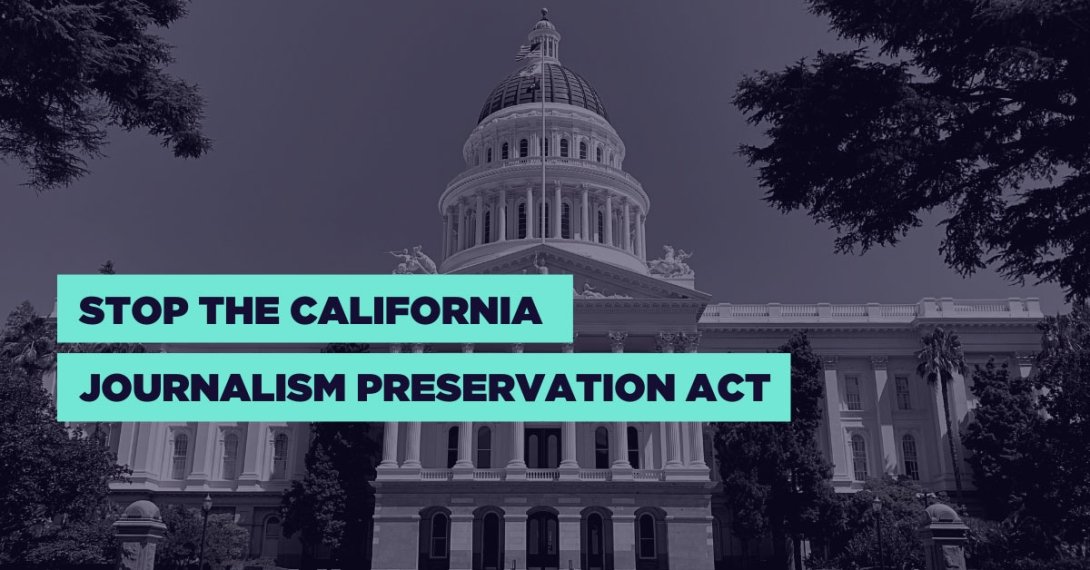
In November, we analyzed the bill’s projected harms in our study Crumbs for California: How a Bill to ‘Save Journalism’ Would Enrich Big Media and Harm Community News Outlets. Authors S. Derek Turner and Alex Frandsen show that the bill would result in a massive giveaway to large and profitable media outlets — and promote clickbait over meaningful local reporting. In December, Jessica J. González drew on these findings in comments before the California Senate Judiciary Committee. “Money would flow into the pockets of corporate chains and hedge funds,” she said, “funding entities that are actively hollowing out local newsrooms to grow their bottom lines.”
We’re urging lawmakers to consider better options — such as a publicly funded nonprofit modeled on the New Jersey Civic Information Consortium, which we helped create. Since 2021, that state-funded nonprofit has awarded grants to some 30 organizations focused on diversifying journalism, improving government transparency, providing community-health news and better serving communities of color and immigrant communities. Mike Rispoli sits on the consortium’s board and both Rispoli and News Voices Director Vanessa Maria Graber serve on the strategy committee.
Some California lawmakers have already shown their interest in solutions that benefit communities. A new $25-million state-funded program at the University of California, Berkeley, is designed to strengthen local reporting in underserved and underrepresented areas across the state. Free Press Action helped bring this program to life, and Mike Rispoli sits on its advisory board.
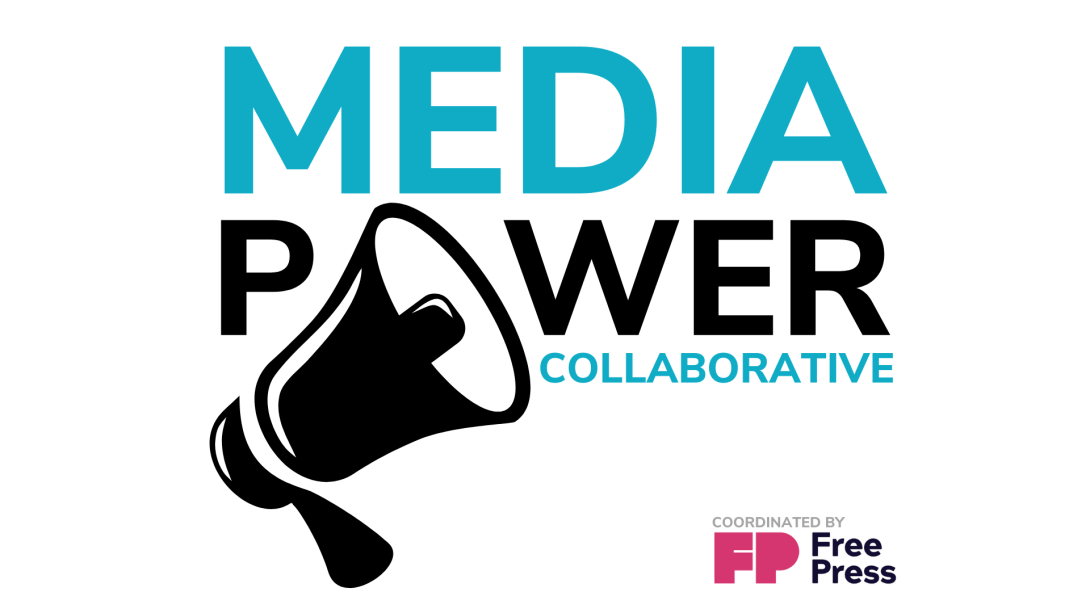
The Media Power Collaborative, which Free Press launched in 2022, brings together media workers, movement organizers and researchers to develop and win transformative journalism policies. We held multiple meetings in 2023, including one in which Free Press staffers led a workshop on narrative power. By the end of 2024, the MPC will become a hands-on policy-organizing laboratory, with members contributing to state and local campaigns around the country.
CREATING JUST AND EQUITABLE LOCAL NEWS
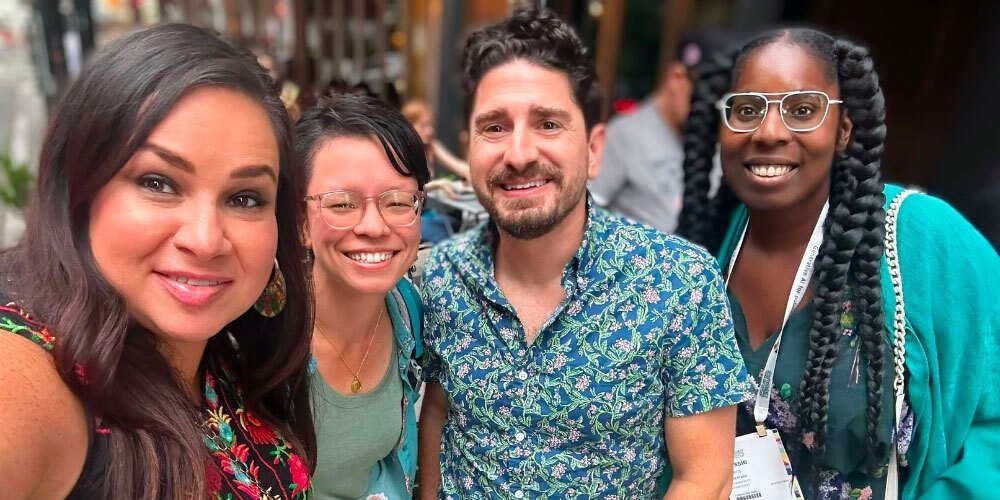
News Voices Director Vanessa Maria Graber with Free Press colleagues Alisha Wang Saville, Mike Rispoli and Cassie Owens at the ONA journalism conference
Free Press’ News Voices project, which launched in New Jersey in 2015, builds power with communities so people have a strong voice in how local news can be revived, strengthened and transformed. News Voices has worked in cities and states throughout the country and has had a strong presence in Philadelphia since 2019. There, Free Press and its allies within the Journalism Accountability Watchdog Network — the Philadelphia Association of Black Journalists and the Philly chapters of both the Asian American Journalists Association and the National Association of Hispanic Journalists — hold Philadelphia news outlets accountable for their treatment of both journalists of color and communities of color. In February, J.A.W.N. won the Pen and Pencil Club’s award for Collaborative Journalism Project of the Year.
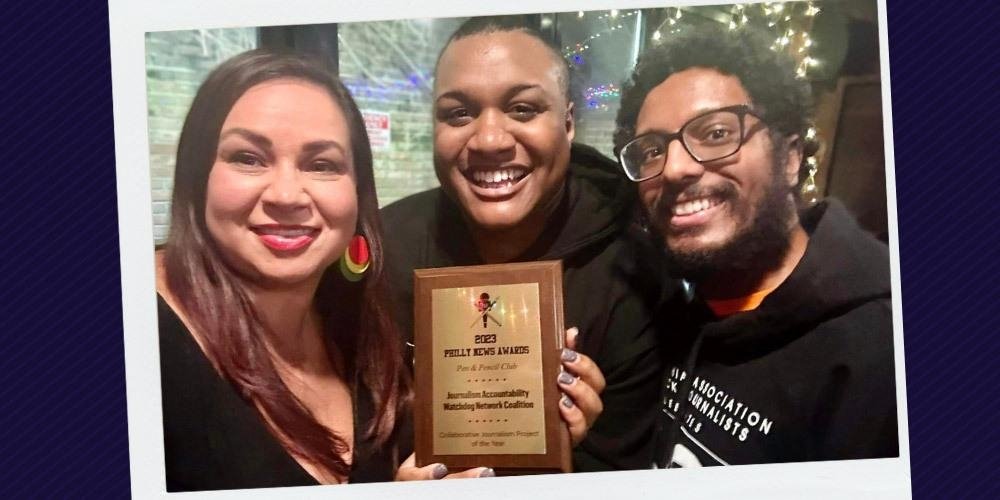
Free Press’ Vanessa Maria Graber and former staffer Tauhid Chappell (left and right) with J.A.W.N. coalition partner Ernest Owens
Much of J.A.W.N.’s work has centered on pushing to dismantle structural racism at The Philadelphia Inquirer. But the newspaper’s leaders have failed to address issues around diversity, equity, inclusion and coverage of Philly’s diverse communities. In May, J.A.W.N. issued a vote of no confidence in the paper and is deepening its emphasis on working with organizations that value community engagement.
News Voices: Philadelphia Program Manager Cassie Owens and former staffer Tauhid Chappell held a series of virtual community workshops in Philly on mental health and harm reduction. These workshops grew out of the knowledge that coverage of crime and public safety can stigmatize, misrepresent and traumatize communities. The workshops brought together organizers and therapists to discuss what types of care and programming would best serve Philadelphia residents who have suffered the impacts of problematic and outright racist media coverage.
In 2021, News Voices: New Jersey co-founded the New Jersey Community Media Collective, a network of hyper-local media outlets addressing underserved communities’ information needs. The collective is currently working on a community health-and-access project focused on the unique information needs of BIPOC communities in Atlantic City, Bloomfield, Newark and Trenton.
In July, Free Press, the Center for Cooperative Media and the New Jersey League of Conservation Voters hosted a forum on environmental justice and the climate crisis. New Jersey-based organizers and journalists provided recommendations for more in-depth coverage and called for relationship-building with frontline communities.
In October, Free Press launched the Reparative Journalism Project, which focuses on building new systems to repair harm. Drawing on the community-organizing model of News Voices and the media-reparations mission of Media 2070, the project highlights the need to prioritize healing in communities to confront journalism’s violent and racist past. The project launched with a video, “A Journey Toward Reparative Journalism,” that explores the journalism industry’s history of harming Black and Indigenous communities. In the coming year, Free Press will produce more videos in this series, including one that considers what global justice movements can teach journalists about repair.
GETTING THE WORD OUT
In 2023, we had more than 2,200 press hits in outlets including the Associated Press, CNN, The Guardian, NBC, The New York Times, NPR, Reuters, TIME and The Washington Post. We published 26 Op-Eds in 2023, including prominent placements in CNN and TIME.
To join our community online and stay up to date on our work, you can follow Free Press on Facebook, Instagram, TikTok and Twitter.
FUND THE FIGHT
Your generosity makes our work possible. Please make a special gift in honor of Free Press’ 20th anniversary to make sure we can keep fighting for media and tech policies that improve people’s lives. We’re actively fundraising to meet our budget goals for this year and to ensure we’re here to fight for your rights to connect and communicate in the future. You can give with confidence knowing that we don’t take money from business, government or political parties.

You can support us by making a one-time or monthly donation online or by mailing a check to P.O. Box 60238, Florence, MA 01062. You can also make a contribution through a donor-advised fund, a gift of stocks or securities, or a planned gift. For more information, please visit other ways to give or reach out to us.
Thank you!
ABOUT US
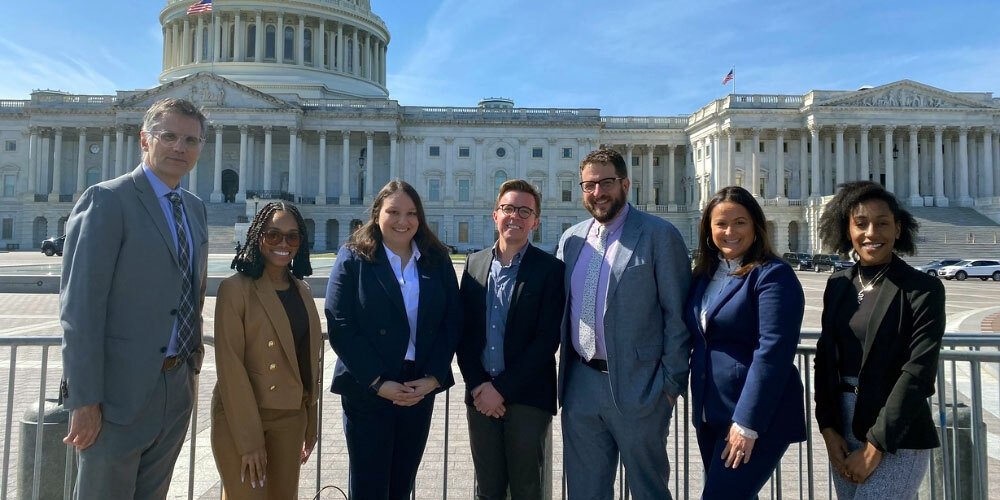
Free Press was created to give people a voice in the crucial decisions that shape our media. We seek to change the media to transform democracy to realize a just society. Learn more about our mission.
Our amazing staff of organizers, lawyers, strategists, storytellers, researchers and advocates is 35 people strong. We’re building an organization that can bring to life a media system that supports a just and multiracial democracy. Learn more about our staff and board.
Please note: We will post financial information for 2023 when it becomes available in spring 2024.
Free Press and Free Press Action are nonpartisan organizations fighting for your rights to connect and communicate. Free Press and Free Press Action do not support or oppose any candidate for public office.
